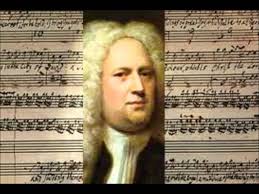Confession: it never crossed my mind that people listened to Handel’s 1741 Messiah as an Advent or Christmas seasonal thing until I was an adult attending classical music events on a regular basis. I myself listen to it around Easter, because, well, that’s how I grew up hearing it.
It was a family thing in our Catholic household of ten, hearing the Hallelujah Chorus blaring from the speakers on Easter Sunday morning, a sound as embedded in my memory as the crinkle of the cellophane covering the Easter peeps (that were so adorable in their rows of five, which I never ate, probably for that very reason). This, amid the clamor of five sugar-energized kids, a baby and two teens, Mom’s voice calling over the din to not eat too much chocolate before breakfast or church, which, of course, I proceeded to do.
Ahh, Easter. Welcome, Messiah.
This is Holy Week, somber and contemplative – an ideal time to be listening to Handel’s grand oratorio. I will, of course, save the Hallelujah Chorus for Sunday morning. Hearing it will put me right back in that powerful place, where high art meets spirituality, making life seem timeless, utterly rich, and, on Easter morning, nothing short of miraculous. (And very sweet!)
Whether you are an Easter Messiah-listener, or an Advent one, you’ll likely enjoy this Top 10 list I created years back. It was so much fun to reread just now, I couldn’t resist.
10 Fun Facts about Handel and his Messiah
1) The original [German] spelling and pronunciation of George Frideric Handel’s name is Georg (GAY-org) Friedrich Händel (HEN-del). His father was a barber-surgeon (I know, right?) and Georg’s original game plan for life was to study and enter the practice of law. While in law school, he started playing the organ for a local church, and, well, that started the composing music ball rolling.
2) Handel was British but not, just like King George I was British but not. King George I was German-born, from Hanover. Before the young Handel moved to England, he’d served as Kapellmeister for George (then the Elector of Hanover) in Germany before he became King of England. Once they were both in England, well, it was likely an easy choice to stay affiliated. Handel loved England, and 1726 he became a naturalized British subject.
3) By 1741, Handel had fallen deeply into debt, and was even threatened with debtors’ prison. Instead, he departed to Ireland for a sabbatical, where he wrote his Messiah.
4) Handel composed Messiah in just twenty-four days, a staggering feat, given the original score is 259 pages. Yikes. That’s some productive off-time. (Author’s note to self: sign up for sabbatical.)
5) In spite of the fact that Handel himself was in bad shape financially, he premiered Messiah in Dublin as a benefit, to help out some of the inmates stuck in debtors’ prison. The benefit performance was a rousing success, and 143 debtors were released from prison as a result.
6) As a gesture of thanks, Handel’s Irish backers returned the favor by paying off some of his own London debts.
7) The first London performance, a year later, wasn’t as unequivocal a success. Criticism was voiced that the work’s subject matter was “too exalted to be performed in a theatre, particularly by secular singers.” Handel tried to appease the conservatives by using a different name, calling it the “New Sacred Oratorio” instead of “Messiah.” Even then, however, the London reception of the production remained cool, and the oratorio was only performed three times that year instead of the anticipated six. Until, a few years later, at the London Foundlings’ Hospital…
8) Handel performed a mix of new music and older pieces including the “Hallelujah” chorus at London’s Foundling Hospital, in 1750, for a charity concert. At the time, Messiah hadn’t made its splash with London audiences (see above), but the concert was so well received that Handel was invited back the next year, where he performed the entire Messiah oratorio. Performances of Messiah became an Easter-time tradition there until the 1770s. Earnings from many early performances of the oratorio were used to help the poor, needy, orphaned, widowed, and sick.
9) The complete oratorio of Messiah has fifty movements, but it was otherwise a modest production. In the years after Handel’s death, Messiah was adapted for performance on a much larger scale, with giant orchestras and choirs. Mozart, as well as a few other composers, played around with it, offering a fresher (at the time) adaptation. Today you can buy the Mozart adaptation, the original, an abridged version, popular excerpt version, Part I & II version, etc.
10) Audiences typically stand during the “Hallelujah Chorus” movement of Messiah. One story as to why dates back to when King George II (son of King George I) heard it being performed for the first time. Story has it, he was so dazzled, so overcome with emotion, he rose to his feet automatically. And when the king rises, all rise. So, there it is. Fact or myth? You make your own call.
Bonus fact: Handel died on Good Friday, 1759. He was buried, with honors, at Westminster Abbey, during which time a portion of his Messiah was performed. He will be forever remembered for his contribution. Somewhat poignantly, once after being congratulated on providing audiences with such fine entertainment, he’d replied, “I should be sorry if I only entertained them. For I wished to make them better.”
Oh, Mr. Handel. That, you did. And for that, the world will be forever grateful.



Brings back memories Terez.
Hopefully good ones, Annette!
Easter listener!
Easter. Happy Easter, everyone!
Yay, Jess and PJ! And a very happy Easter season to you!
Christmas!
Duly (and belatedly) noted, Charles! Two Easters to one Christmas.
Given the date of Mr. Hendell’s première, well, yes, Easter. Equally, though, a Christmas without a few dozen local choral societies and amateur choirs doing “Messiah” would be a “Bleak Midwinter” indeed. (And my favourite part is “For Unto Us a Child is Born”, which tips my balance … and “O Thou that Tellest Good Tidings to Zion” has as pretty an accompaniment as you’ll hear anywhere … and … )
Let’s face it, it’s wonderful anytime, especially if the orchestra is a modestly sized “authentic instruments” ensemble. Why limit yourself? 🙂
Well put, Steve!